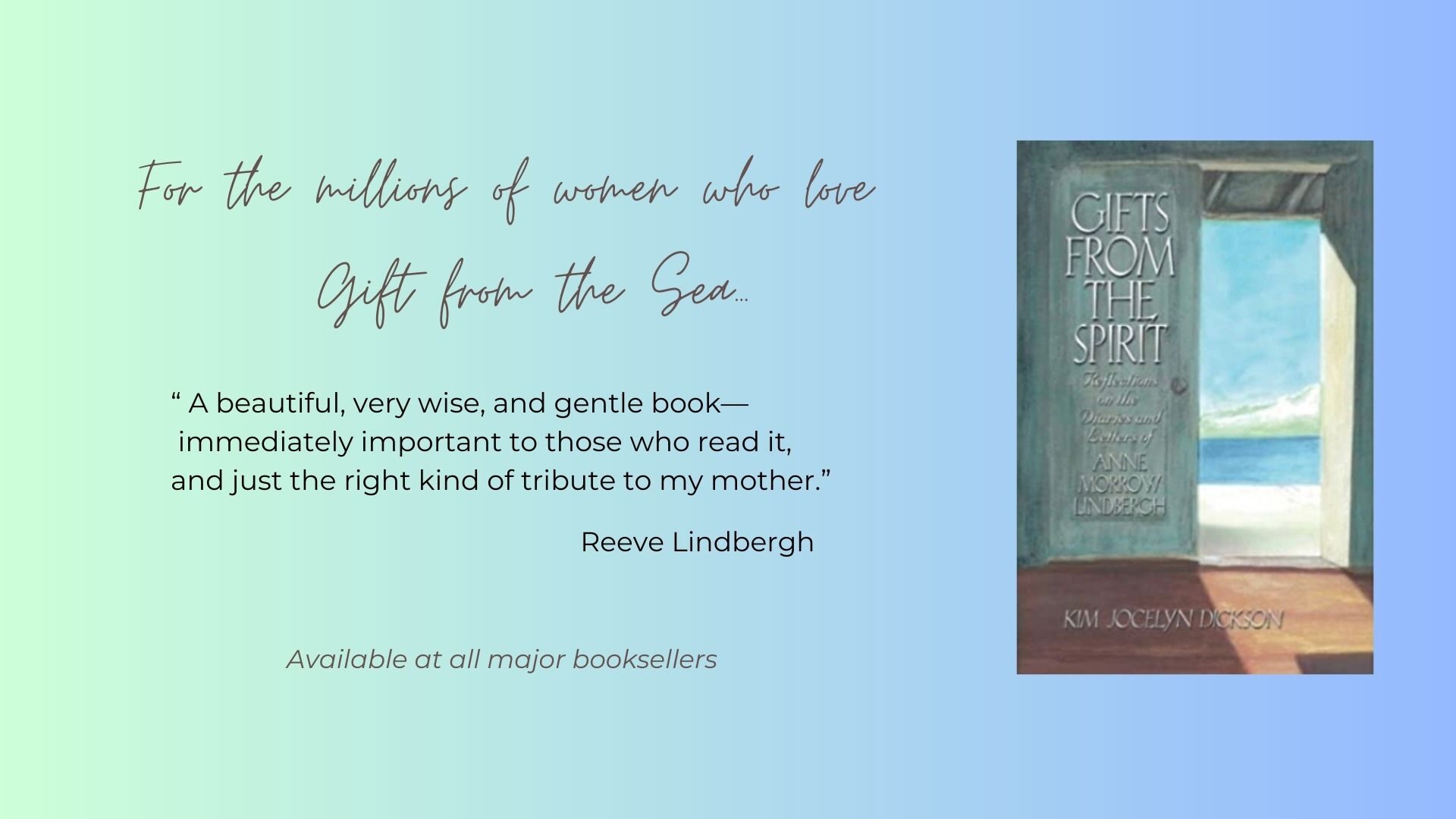My Visit to Long Barn
Not long after I fell under the spell of Anne Morrow Lindbergh’s writings, I was fortunate to visit many of the places she had lived and described vividly in her diaries and letters.
While living in Princeton, New Jersey, I visited the Lindberghs’ first home in nearby Hopewell, the scene of the tragic kidnapping and murder of their son.
During this same period, I spent several vacations with good friends at their family home on the wildly beautiful island of North Haven, Maine where Anne’s family also had a summer home.
I explored Next Day Hill—now the Elisabeth Morrow School—Anne’s mother’s home in Englewood, New Jersey, where Anne and Charles found security in the aftermath of the tragedy when they couldn’t bring themselves to return to their Hopewell home.
Years later, when a dear friend invited me to Sanibel Island, Florida I leapt at the chance to see her and visit nearby Captiva Island, Anne’s winter retreat. While staying at the ‘Tween Waters Inn, she had walked the beach, collecting the shells that would become the jumping off point for her reflections in Gift from the Sea.
Just before my book about Anne was published, I visited Anne’s daughter Reeve Lindbergh in Vermont. She invited me to see her mother’s final home, a chalet that Reeve and her husband had built for her on their farm, an experience so powerful that I had to write about it.
Because Anne’s writings are so evocative, I felt, in every circumstance, as if I’d been there before. I also felt as if she’d left something of herself in each of these places. Never did I sense her presence more profoundly than I did in the little chalet in Vermont.
There were two homes that I thought I’d probably never have the opportunity to visit. Both are now privately owned. One was the island of Illiec, off the coast of Brittany in France. The other was Long Barn, an ancient Tudor style home and garden in the countryside of Kent in England.
When I accepted the invitation to present at the World Literacy Summit in the UK this past spring, I knew I had to explore the possibility of a visit to Long Barn.
With a little research, I discovered that the home is now owned by the Lemonius family and that Rebecca Lemonius teaches gardening classes in groups of 8 and up to 50 people.
I emailed Rebecca and explained my circumstances and reasons for wishing to visit. She could not have been more gracious about saying ‘yes’ to my request that was outside of her usual visitors’ schedule. The only day that would work for each of us was the morning right after her family returned from their spring holiday and my final day in the UK.
I was elated that she was willing to be so flexible in having us and grateful that my friend Beverly, who had come over to join me in London, was also interested in this side trip.
We boarded an early train from Victoria Station, met our hired driver at our stop in Otford, and headed into the village of Sevenoaks, just as planned on a very chilly, damp April morning.
At the end of an uncrowded lane, a stone marker with ‘Long Barn’ painted in white unobtrusively announced that we had arrived at our destination.

Rebecca came out to the gate to meet us.
It was suddenly very quiet as we stepped out and opened the gate. There were lots of birds singing. We tiptoed around to the back and found the two arms of the low house made a court and then looking down the hill—over gardens to to fields and hills and farms—all quiet, all country, all still…I laughed—for joy, really, such a house!
The Flower and the Nettle, p 25
The feeling of deja vu swept over me once again. The rambling 14th century house with attached barn that forms an “L,” the terraced garden, and the privacy afforded by the rolling countryside beyond were all just as Anne had described them.

In the wake of the kidnapping and murder of their first born son in the 1930s and the ensuing relentless publicity, the Lindberghs were desperate for privacy and security. When their second son Jon was born and he too was threatened with kidnapping, they decided they could no longer live in the United States. They departed for Europe where they hoped to find privacy and peace.
England provided that. When diplomat Harold Nicholson and his poet wife Vita Sackville-West offered the lease of their secluded country home in Kent, the Lindberghs gratefully settled in and were left alone to live their lives quietly.
The Nicholsons, amateur gardeners who had designed and created the outdoor spaces, had described the house to the Lindberghs as “…a happy house…it comes out and jumps all over you like a spaniel!” (The Flower and the Nettle, p. 26)
After the interminable nightmare of losing her child and the subsequent storm of publicity, Anne finally found the respite she craved.

It is so beautiful and calm and still and the birds singing. I am reminded strangely of Hopewell—of all we hoped to find there—and also of those strange suspended days of hope in the middle of those awful weeks, days, when it was warm and like spring and I said, ‘It is going to be all right. It can’t be so terrible in beauty like this.’ It was the feeling that I had then of hope and life pounding back into you when you got some good word. (Like lack of pain after pain—a positive stream.) So I felt, sitting there, relief and peace and joy in living—a positive stream flowing back into me.
The Flower and the Nettle, p. 30
Able at last to enjoy her family, and to write, reflect, and walk in the garden and nearby fields in peace, Anne’s ideas for Gift from the Sea, the classic she would write one day, began to take hold.

Rebecca invited us to explore the garden on our own at leisure upon our arrival, and I was glad for the opportunity to quietly take it all in.
The gardens are laid out in terraced spaces almost like rooms, so are visually and artistically beautiful and interesting to wander through. They seemed remarkably unchanged from the photographs Anne had included in her published diaries and letters. The centuries-old house that appeared to tilt in places appeared unaltered as well.


I could easily imagine Anne sitting on the stone steps watching her young son Jon play or tramping in her Wellies through the damp fields below with Charles and Jon and their dogs.



Eventually Rebecca brought out a tea tray, a delicious sort of pastry called a British Flapjack,* and an enormous stack of books on the history and inhabitants of Long Barn.

She seated us at the weathered wooden table and poured us tea, for which I was grateful. Bev and I were bundled up within an inch of our lives with hats, gloves, and warm coats, but I noticed Rebecca hadn’t even bothered to zip up her jacket. Her forebears were the people who stood up to Hitler, after all. What’s a little cold?
Between the hot tea and Rebecca’s conversation, a talk on the history of the property, I quickly forgot the chill.
I won’t recount everything she shared with us as some of it was quite personal and she’ll no doubt write about it herself one day, but I will tell you that a theme emerged as Rebecca relayed what the home and gardens have meant to her family and to generations of inhabitants.

Just as Anne found peace and healing at Long Barn and the ability to embrace life again after tragedy, others have found it to be a safe haven as well.
Rebecca explained that after the Lindberghs departed, the Nicholsons allowed the home to be used as a refuge for “bombed out babies” orphaned in the Nazi air raids over London. (See photo here.)
When one of those orphans grew up and was quite elderly, he contacted Rebecca, and explained to her just what those years at Long Barn had meant to him during that terrible time.
Today, a refugee from another war, a 17 year old Ukrainian boy, lives with Rebecca and her family at Long Barn.
Anne. The orphans of the Blitz. Rebecca herself. The young Ukrainian boy. It seemed to me that the generations of inhabitants who have been sheltered here shared a common need for refuge.

If a home can be a living and breathing entity with an ability to gather in those who need its protective comfort, Long Barn appears to be just that.
Anne recognized this too as she prepared to leave it.
…how I love it and hate to leave it. It is a very personal feeling. I love this house as if it were mine, part of me—as if I had made it and it had recognized and accepted me as belonging to it…And the precious quality of the happiness we have had here. I feel dimly that I shall look back on this period as the happiest in my life—the two years in this house.
The Flower and the Nettle, p. 268
I left, grateful that Rebecca had welcomed us in to share, even for just a morning, the peace and beauty that had embraced Anne Morrow Lindbergh and so many others.


*British Flapjack Recipe (Courtesy of Deb Duffin)
Note: Through trial and error, I learned NOT to over bake and to use equal parts (2 1/2 tbsp.each) golden and dark syrup in place of Lyle’s Golden Syrup which is hard to find. Also, like Rebecca (see above), I use parchment paper to line the pan.
They are DELICIOUS! Cheers!














